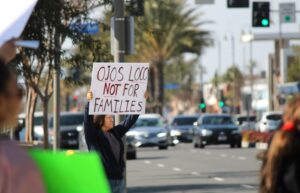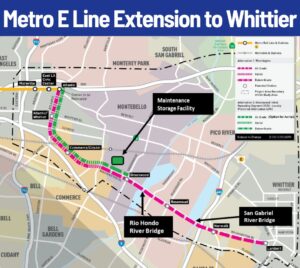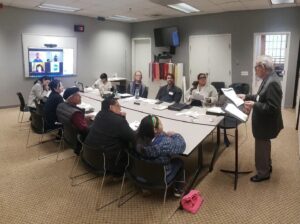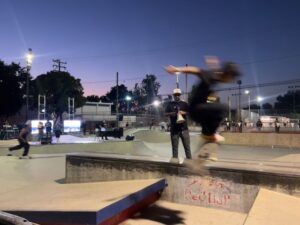By: Joe Brizzolara
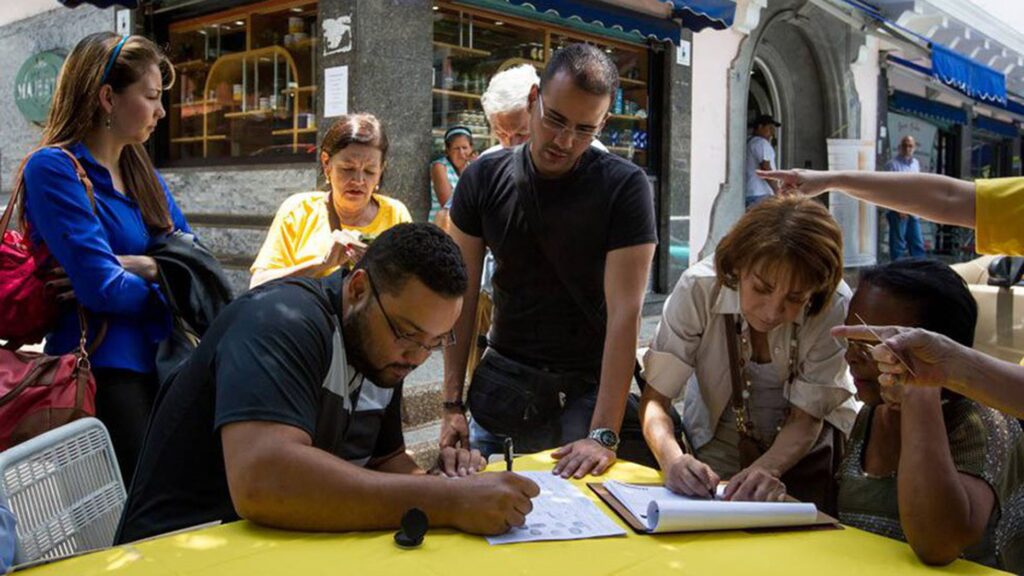
Downey real estate interests poured thousands into the unsuccessful recall of District Three Councilmember Catherine Alvarez, a vocal advocate for renter protections, an analysis by Downey Latino News determined.
This media outlet also learned that 74% of funds were attached to addresses outside of Alvarez’s district and that over half of the recall committee’s spending went to paid campaign workers.
On Feb. 16, Downey City Clerk Alicia Duarte announced that recall organizers had failed to secure enough signatures to force a special election for Alvarez’s removal. The LA County Clerk found that only 3,419 of the 4,090 submitted signatures were valid.
Organizers needed 3,454 signatures to get the recall on the ballot. The LA County Clerk’s office confirmed that recall proponents are challenging the signature count.
“Since we were only 35 [signatures] short (from over 4,000) we will appeal the verification of signatures and move forward,” recall organizers said in a statement published on their Facebook page. “Over 4,000 signatures were collected. It speaks volumes and encourages our team of volunteers to keep on going and never give up.”
Those in the real estate industry, their family members, and others with ties to the Downey Association of Realtors (DAOR) account for at least 54% of the $18,087 collected by the Catherine Alvarez Recall Effort by Concerned Citizens of Downey, the committee behind the recall. Those real estate interests include realtors, real estate service providers, and developers.
“If I (pass) rent control in the city, their income is going to be affected,” answered Alvarez after being asked why she believes real estate interests have financed her recall. She points to the percentage of homeowners to renters in the city, nearly 50-50 according to the U.S. Census Bureau’s most recent statistics.
“We need to be working for both,” she adds. “It needs to be equal.”
‘Leading this effort’
The California Real Estate Political Action Committee (CREPAC), a campaign cash machine operated by the influential and deep-pocketed California Association of Realtors (CAR), made a $2,500 contribution to the recall campaign on Oct. 14, 2021.
When asked about their donation, a representative of CAR said the DAOR was “leading this effort.” CAR is a lobbying outfit that advances real estate interests statewide and includes more than 100 local member associations of which DAOR is one.
When asked to confirm DAOR’s role in the recall effort, the organization’s Government Affairs Director Louie A. Lujan offered this statement: “REALTORS® support candidates and policies that share the values of increasing the housing supply and homeownership opportunities. We also oppose candidates who do not share these values.”
CAR Public Relations Director Lotus Lou gave a similar statement when asked about affiliate organizations securing donations from CREPAC: “REALTOR® members throughout the state work together to help advance candidates that share our common values, such as advancing homeownership opportunities in California. Contributions provided to candidates are a reflection of that work.”
Multiple questions sent to DAOR regarding their role in the campaign and their position on Alvarez-backed policies went unanswered as of press time. The recall committee also did not return requests for comment.
The recall campaign focused its attention on Alvarez’s past criminal convictions, which were not widely known when she was elected in 2020—two misdemeanor charges related to welfare fraud in 2014, along with a misdemeanor petty theft conviction in 2013, both of which resulted in arrest warrants for missed court appearances.
The convictions have been resolved and Alvarez says she’s paid her debt to society.
The makeup of the financial contributions to the recall effort call into question whether Alvarez-supported housing policies, like a citywide rent stabilization ordinance, may have been another catalyst for her attempted removal from office.

Eviction Moratorium 2019
Alvarez first crossed horns with the DAOR in 2019 when, as co-founder of the Downey Tenants Union, she advocated for an eviction moratorium ahead of the implementation of AB 1482. AB 1482 took effect in 2020 and capped annual rent increases at 5% plus inflation statewide.
Tenant advocates charged that landlords were getting ahead of the law by jacking up rents before the caps began and also by evicting tenants—clearing units that could then be rented at a higher starting rate and also sidestepping a prohibition on no-fault evictions introduced by the law.
While multiple other cities in the region passed emergency eviction moratoriums to protect tenants from displacement in the interim between the law’s passage and its enactment, the Downey City Council refused to even vote on the matter.
District Two Councilmember Sean Ashton’s motion for an emergency moratorium died after receiving no supporting motion from his fellow councilmembers. Then-Mayor Rick Rodriquez, who contributed $1,000 to the Alvarez recall effort, recused himself from the discussion because he owned rental properties and would be personally impacted by the decision.
Former-Mayor Alex Saab, who has previously served on the DAOR’s Professional Standards-Ethics Committee and on their Grievance Committee, contributed $250 to the recall and opposed the moratorium.
“Owning a property is essentially having a business, and passing an ordinance that usurps that right goes against property rights,” Saab said during the eviction moratorium discussion. “Rent control ordinances hurt the housing market (and) hurt tenants.”
Saab references “rent control” in the discussion despite the fact that the item introduced was a pause on no-fault evictions, lasting less than two months, and not a cap on rent increases.
“It’s already affected people who want to do business in our community,” Saab continued, “They’re already concerned about what kind of message our city government (is sending by even) just considering this.”
“It might not be the right law,” argued Ashton about AB 1482, “But it’s the law that we’ve been given and it’s the ramifications that we’re dealing with… the right decision at this time is to give our residents the opportunity to stay where they are at until things stabilize.”
The DAOR went so far as to threaten the city with legal action if they passed the moratorium.
“Knowing that AB 1482 will become law on January 1, 2020, we believe the City Council should be patient and wait for the law to go into effect,” a letter sent by DAOR President Dan Nevarez to city council reads. “(Instituting) moratoriums on evictions ahead of January 1, 2020… will force us to take legal action and seek an injunction.”
The Recall Contributors
While only 4 of the 34 contributors listed real estate as their occupation on financial disclosure forms, several additional contributors were found to have close ties to the real estate industry.
Committee co-chairperson Lisette Rivera, who donated $1,870, listed “Special Needs Advocate” and “Self employed” as her occupation. As recently as 2018 she was a realtor for the Entertainment Division at Keller Williams Realty, Inc., according to her Linkedin profile.
Maria Arencibia, who donated $145 and works for Coca Cola, is also connected to Keller Williams through a relative with the same surname whose promotional videos were posted on Arencibia’s husband’s Facebook page.
Lee Monne, a resident of District Four who donated $1,400, listed his occupation as “None.” According to the California Secretary of State’s business search, Jonathan Lee Monne is listed as the agent for service for Conquista Realty, Inc. which is based in Downey. Conquista’s California Franchise Tax Board status is currently suspended.
Dorothy Pemberton is a senior recall campaign official and frequent spokesperson. She donated $704 and is a Downey-area agent at Century 21 Real Estate, with over 30 years in real estate according to her agent profile. Patricia Anne Morris donated $500 and is also an agent at Century 21.
District Three resident Everett Greer donated $200 and listed his occupation as “Retired.” Greer is the managing member of Greer Advisors, LLC, a real estate services company, according to the company’s website.
Hector Sosa, an insurance agent who plans to pursue Ashton’s newly resigned seat, donated $100 to the recall.
Jeffrey Allensworth, a broker and principal at Allensworth Realty and DOAR Treasurer in 2012, donated $100. Albert Makasjian, chief executive officer of ARC General Building & Roofing Contractors, Inc., donated $100.
Ronald A. Kolar, founder and chief executive officer of the L’Abri Organization, donated $1,000 as did Jeremy James Fitzl, a property manager for L’Abri. The L’Abri Organization provides property management and other real estate services, according to their website.
Other Findings
Roughly 74% of total monetary contributions received by the campaign were attached to addresses outside of council District Three. Around 33% of contributions came from District Four and 34% came from outside the City of Downey. Roughly 6% came from District Two and less than 1% came from District One.
Contributors are required to use their home addresses, which do not necessarily reflect their employment locations. We found that multiple contributors with addresses outside of Downey were employed within the city.
Despite the recall committee characterizing itself as a volunteer-based campaign, disclosure forms revealed a total of 11 campaign workers were employed by the committee. Their combined compensation totalled $8,840, according to campaign finance filings.
The committee had a total of $16,117 in expenditures. Other expenses include printing campaign materials, consulting, and bank fees.
Hector Sosa, an insurance agent who plans to pursue Ashton’s seat amid news the councilmember will be resigning, donated $100 to the recall.
Despite Alvarez’s claims of a “Republican” recall, multiple recall contributors previously donated to Democrat candidates, according to campaign finance forms.
Narandra Patel, a hotel owner who resides in South Gate, donated $500 to the recall and has previously contributed to Congressperson Linda Sánchez (D-Artesia) and her primary opponent in the race, former state Assemblyman Hector De La Torre (D-South Gate).
Former Mayor Saab donated to state Senator Susan Rubio (D-Baldwin Park) in 2018. Carlos Galvan, Vice President and CFO of La Amapola, Inc., donated $100 to the recall and to Health and Human Services Secretary Xavier Becerra’s 2002 run for congress.
Contributions under $100 are not required to be itemized and were not included in this analysis. The recall committee received a total of $523 in unitemized contributions. This analysis covers contributions received between July 1 and Dec. 31 2021.
Activist Turned Councilmember
When Alvarez ran in 2020 on a platform of increased tenant protections, the DAOR endorsed Downey Patriot editor and DAOR member Eric Pierce.
“As a member of the Downey Association of Realtors for many years, I am honored and proud to receive their endorsement,” said Pierce at the time. “Realtors contribute so much to our local economy, and our Downey realtors work hard to keep our neighborhoods clean and safe.”
In that election cycle, CREPAC donated to Pierce, District One Councilmember and current state Assembly hopeful Blanca Pacheco, and realtor Carrie Uva’s unsuccessful bid for District Five. Pearce also received funds from several real estate sources including L’Abri Management Inc., Dorothy Pemberton, and Saab who would all become recall donors.
While recall supporters have criticized Alvarez for staging protests outside of the personal residences of councilmembers during the moratorium debate in 2019 and again in 2020 calling for rent and mortgage forgiveness amid the onset of the pandemic—saying Alvarez “terrorized” officials and their families—they have largely refrained from citing specific policies disagreements other than her vote against establishing a code of ethics.
“She lied to the residents of District Three,” said former Downey Mayor and state Republican Executive Committee Member Mario Guerra last November in a video posted on the recall campaign’s Facebook page. “(If a recall election occurs) at least you will be an informed voter, knowing about her criminal past.”
Guerra, who donated $1,000, did reference rent and mortgage forgiveness on a podcast, which he co-hosts with Pierce.
“She wanted free rent for everyone in Downey, and to waive all the (home) loans,” said Guerra. “Things that the Downey city council does not have the authority to do”
While pushes for rent and mortgage forgiveness by tenants advocates abounded, none were successful. The City of Downey did implement rental assistance for those impacted by COVID-19, as did many other governments nationwide. The council also implemented an eviction moratorium due to COVID-19.
Pierce asserts he is not personally involved in organizing the recall but he does support a recall election taking place.
“She has her defense for her criminal record,” Pierce said on his podcast, “But I think the point is that the voters didn’t know her criminal record at the time of the (2020) election.”

Push It Along
Recall organizers are undaunted in their struggle to remove Alvarez from office.
“Our grassroots effort was slow in late 2021 due to the holidays, weather, COVID and will now be able to dedicate our efforts to regroup and proceed to gather the additional signatures needed,” their Facebook page reads.
“Downey residents in her district are frustrated. They now know the facts about who she is and her criminal record. It will be easier and faster now to build support from the community and to collect more signatures.”
Alvarez is similarly pumped for the future.
After not supporting her own motion to explore a rent stabilization ordinance—she didn’t believe she had the votes to get it passed—she wanted to give consensus building a chance.
“I wanted to work with them because that’s what they were telling me, ‘work with us,’” she remembers. “But I didn’t see (any) effort (on their part) so now I’m bringing it back.”
At Tuesday’s meeting, Alvarez is sponsoring a subcommittee that will explore a rent stabilization ordinance that goes beyond the cap instituted by AB 1482. She wants to use that vehicle to broker a deal between the real estate lobby and renters that gives the ladder more financial security. If that doesn’t work?
“I will bring (a rent stabilization ordinance) to the ballot. That’s my commitment. People will vote for it and it will pass.”




